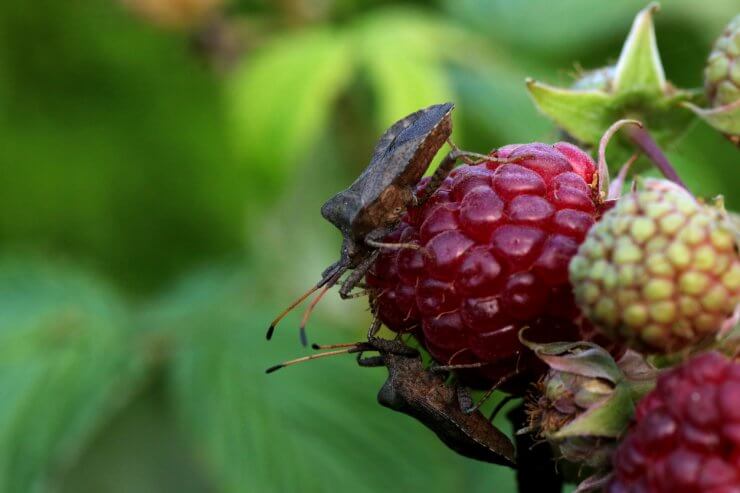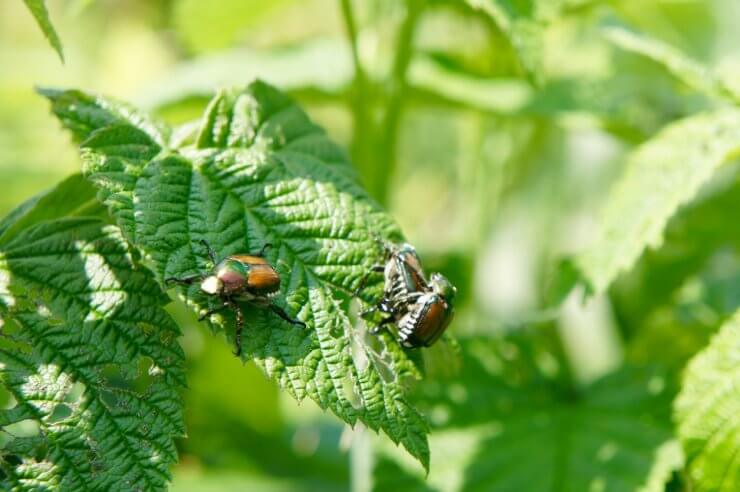
Beetles on raspberry plants
Pests in your raspberry patch, left unchecked, can damage and destroy your precious raspberry plants. Keeping a close watch on your plants during regular daily inspections will help you spot any pests before they can do irreparable harm. Healthy raspberry plants can bounce back from pest damage if you catch the pests quickly.
Spot the symptoms of raspberry plant pests
Check leaves, stems, and fruit for these symptoms that come from pests on the prowl!
On Raspberry Leaves and Stems
| Symptom | Pest |
| Elongated holes | Raspberry fruit worm |
| Wilted canes | Raspberry crown borer; red-neck cane borer; raspberry cane borer |
| Holes in plant leaves | Japanese beetles |
| Swollen canes | Red-neck cane borer |
On Raspberry Fruit
| Symptom | Pest |
| Deformed fruit | Japanese beetles; tarnished plant bug; sap/picnic beetle |
How to treat pests on raspberry plants

Beetles on raspberry leaves
Here are some proven ways to get rid of pests on your raspberry plants. Choose the best treatment for the type of pests invading your plants.
- Pick off the pests. Use your garden gloves to remove the pests by hand. After removal, destroy pests by drowning them in a bucket of soapy water or crushing them with your foot. Handpicking isn’t efficient or practical for very small pests, but works well with larger pests such as the Japanese beetles.
- Remove overripe or deformed fruit. In addition to harvesting your healthy raspberries daily, be sure to remove overripe, damaged, or decomposing fruit regularly. Such fruit can attract the sap/picnic beetle which can quickly become a nuisance in the raspberry patch.
- Apply insecticidal soap. Insecticidal soap is organic. The potassium salts in insecticidal soap help remove an insect’s protective waxes, causing destruction of insect membranes and killing them. Mix the soap with water to create your solution, and apply directly to insects on any plants. While insecticidal soap is less apt to affect other organisms, certain plants might be sensitive to the soap and can suffer leaf burn.
- Apply horticultural oils. Combine plant- or petroleum-based oils with water to produce horticultural sprays. Neem oil, for instance, is derived from seed extracts of the neem plant. Oil-based sprays block an insect’s air holes, interfere with an insect’s metabolism, disrupt insect feeding, and inhibit insect growth. Like insecticidal soaps, horticultural oils can cause plant injury if not properly diluted.
- Make your own pest spray. You can make your own pest spray with benign materials. Mix one tablespoon of baking soda, 1/2 teaspoon of a mild dish detergent, and 2 1/2 tablespoons of olive oil in a gallon of water to make a solution that will repel all kinds of bugs, as well as a fungicide for blight and mildew on the raspberry plant leaves. Shake it well in your bottle before spraying and repeat every week for it to be continuously effective.
Do pests attack your raspberry plants every year? How do you handle removing them—and even preventing them in the first place? Please tell us how you treat your raspberry plants to avoid pests.


 Previous
Previous


What do you do about birds, chipmunks and squirrels?
Guess we lucked out last year as the Japanese beetles torn up my roses and cherry trees but left the raspberries alone. Didn’t know they liked them so will definitely keep an eye out this year.